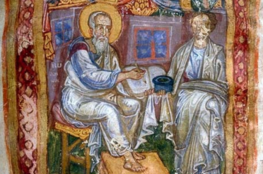Elliot Milco, my friend and author of The Paraphasic web-log, may have just produced his best (blogging) work to date. “In the Absence of a Shepherd” recounts Milco’s days as a student and, later, teacher at a prestigious Jesuit high school in Chicago. More than an autobiographical reminiscence, the post takes a hard look at the chimera of “Ignatian Catholicism” and the deplorable state of Catholic education before concluding with some pointed remarks aimed at the “chief shepherd” of the Archdiocese of Chicago, Blase Cupich. Having first-hand experience with another form of qualified Catholicism, in this case “Vincentian Catholicism,” I sympathize with Milco’s account and wonder what, if anything, can be done to overcome the worldliness of contemporary Catholic education at every stage along life’s way. Setting up alternative, orthodox, centers of Catholic learning is course necessary, but without sizable private contributions and strong institutional support from the Church, they will never amount to more than marginal enterprises benefiting only a select number of souls.
Sticking with the topic of Catholic education for a brief moment, Rod Dreher has come to the defense of New York Times columnist Russ Douthat, who is currently under attack from liberal elites at Catholic colleges and universities for the crime of “heresy hunting.” As a side note, I was shocked to see that my alma mater, DePaul University, is not represented on the list of witch hunters.
As for witches and other demonic things that go bump in the night, an Eastern Orthodox friend of mine, Geoffrey Thompson, offers a pithy critique of the tendency for some Orthodox (and, undoubtedly, other Christians as well) to overly “spiritualize” physical and psychological ailments. Thompson’s observations may not be for everybody, but anyone who has been around certain Orthodox environs more notable for their superstition than spirituality will quickly understand what he’s talking about.
Finally, over at Ethika Politika, Daniel Schwindt reminds us that “The Popes Want Justice, Not Capitalism.” The piece serves as something of a preview for Schwindt’s forthcoming critique of Michael Novak and Paul Adams’s Social Justice is Not What You Think and warns against the liberal project of “reduc[ing] social justice to an individualized virtue.”




October 27, 2015
As I am in the process of explaining, in my series, “The Blood is the Life”, I posit that the problems with Roman Catholic liturgy and theology all go back to the failure of that Church’s hierarchy to learn and to teach Scripture, Tradition, and the Teaching Authority of that Church. If there is any conspiracy, it is one of ignorance and stupidity. I believe that Napoleon’s maxim (“Never ascribe to malice what can be adequately explained by incompetence”) applies here
October 27, 2015
Agreed. If good catechesis doesn’t begin at an early age, however, it’s almost impossible to instill that later in life. Sure, there will be zealous converts and holy souls who, despite poor education, will persevere and ground themselves in the Church’s intellectual heritage. However, they are few and far between. When students are filled with such nonsense during their formative years, what do you expect when, in rare instances, when some decide to pursue a religious or priestly vocation? They’re already corrupted coming into the universities and seminaries; it’s only going to get worse after that.
October 28, 2015
What if no amount of good catechesis is enough? What if the norm, if what has been operative throughout Christendom is not a bottom-up Church, but a top-down one? One which relies and has relied more on the government and the Church working closely together, because without that synergy you will NEVER have a Christian society by taking a more bottom-up oriented approach?